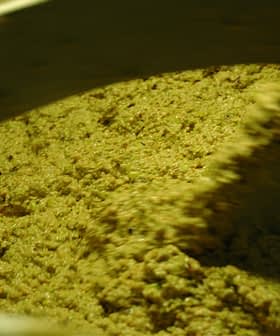Exploring the Health Benefits of Hydroxytyrosol in Extra Virgin Olive Oil
Hydroxytyrosol is among the 25 phenolic compounds found in extra virgin olive oil, playing a role in preventing noncommunicable diseases.
 58.6K reads
58.6K readsThe Mediterranean diet, known for its health benefits and link to longevity, is enriched by the presence of hydroxytyrosol, a potent antioxidant present in foods like extra virgin olive oil and olives. Hydroxytyrosol has been shown to have significant impacts on human health by reducing oxidative stress, modulating inflammatory responses, and improving various cellular functions, making it a valuable component in preventing and managing non-communicable diseases. Ongoing research is exploring the potential of hydroxytyrosol as a nutritional supplement and its role in enhancing the overall beneficial effects of consuming extra virgin olive oil.
The Mediterranean diet has long been studied for its health benefits and link with longevity in the so-called “blue zones.”
The significant presence of vegetables, legumes and fruits and the lower intake of red meat are considered by many as the main sources of these benefits.
However, Tommaso Beccari, a professor of biochemistry at the University of Perugia in Italy, says there is more to it. Among the main reasons for MedDiet’s well-documented effects on human health is the widespread presence of hydroxytyrosol.
See Also:Olive Oil Basics“Its presence in the Mediterranean diet enhances its overall health-promoting effects,” Beccari told Olive Oil Times.
Hydroxytyrosol is present in various foods that constitute the Mediterranean diet’s core.
“The primary dietary sources include extra virgin olive oil, olives, olive paste and olive leaf extract,” Beccari said. “These foods are rich in hydroxytyrosol, which contributes significantly to the beneficial and healthy profile of the Mediterranean diet.”
Besides extra virgin olive oil and olive-derived products, some wine and fruits, such as cherries, also provide varying amounts of hydroxytyrosol.
How hydroxytyrosol affects human health
Hydroxytyrosol is one of the thousands of phenols that occur naturally in plants. Its characteristics make it one of the most beneficial antioxidants among phenols and the other healthy components of extra virgin olive oils.
Its 99 percent bio-availability allows its almost complete integration into the human body upon consumption.
For decades, scientists explored hydroxytyrosol’s impact on mitigating or even preventing illnesses such as cardiovascular diseases, neurodegenerative disorders, cancer, diabetes and lung pathologies, known as non-communicable diseases.
See Also:Health News“The study of hydroxytyrosol began in the late 20th century, driven by an increasing interest in the health benefits of the Mediterranean diet,” Matteo Bertelli, a biotechnologist and chief executive of Magisnat, a company that researches the natural molecules present in the Mediterranean diet, told Olive Oil Times.
“It was in the early 1990s that hydroxytyrosol was identified as a major component of olive oil, leading to intensified research on its properties and potential applications,” he added.
Since then, scientific investigations have elucidated its molecular mechanisms, bioavailability, and therapeutic potential in preventing and treating noncommunicable diseases.
The role of hydroxytyrosol in preventing noncommunicable diseases
Hydroxytyrosol, a potent antioxidant and anti-inflammatory agent, is crucial in preventing and managing noncommunicable diseases.
“The protective effects of hydroxytyrosol against [several] noncommunicable diseases are mitigated through its ability to scavenge free radicals, reduce oxidative stress, modulate inflammatory responses and improve various cellular functions,” Beccari said.
Decades of research allowed scientists to identify some critical mechanisms triggered by hydroxytyrosol intake.
“By modulating inflammatory pathways, hydroxytyrosol helps mitigate chronic low-grade inflammation associated with non-communicable diseases,” Beccari said.
The anti-inflammatory properties of hydroxytyrosol inhibit the production of pro-inflammatory molecules. In most cases, non-communicable diseases are caused by chronic inflammation stretching across a number of years to the point of triggering severe illnesses.
“The anti-inflammatory action of hydroxytyrosol helps mitigate this process, thus reducing the risk of disease development,” Beccari said.
See Also:Polyphenols in Olive Oil Help Heal Damaged Skin“Moreover, hydroxytyrosol influences cellular signaling pathways, gene expression and enzyme activities, impacting multiple physiological processes,” he added.
Ongoing research is investigating additional effects of hydroxytyrosol.
Studies suggest its potential to improve protection against neurodegenerative processes, modulate immune responses, inhibit cancer cell proliferation and regulate metabolic disorders.
On top of that, research has shown that hydroxytyrosol consumption improves endothelial function, which plays a crucial role in cardiovascular health.
Consuming hydroxytyrosol promotes the dilation of blood vessels, enhances blood flow, and reduces the risk of endothelial dysfunction, a key factor in the development of cardiovascular diseases.
“The precise mechanisms underlying these effects are being actively explored to unlock the full therapeutic potential of hydroxytyrosol,” Bertelli said.
Hydroxytyrosol as a nutritional supplement
The unique nature of the phenol prompted scientists to explore new pharmaceutical formulations or nutritional supplements based on hydroxytyrosol.
Beccari and Bertelli are among the authors of a 2020 study published by the Journal of Biotechnology investigating the promising pharmacological activities of hydroxytyrosol.
Bertelli said hydroxytyrosol’s antioxidant properties might support the development of drugs to reduce oxidative stress and prevent or manage associated diseases.
See Also:Olive Oil Health Benefits for Dogs“Additionally, its anti-inflammatory effects make it a promising agent for addressing chronic inflammation-related conditions,” Bertelli said.
“Nutritional supplements containing hydroxytyrosol are already available, highlighting its potential as a natural compound with health benefits,” he added. “These supplements provide a concentrated dose of hydroxytyrosol, offering an alternative means of harnessing its protective effects against non-communicable diseases.”
Ongoing research is exploring new delivery systems and formulations that optimize the bioavailability and efficacy of hydroxytyrosol in supplement form.
Hydroxytyrosol in extra virgin olive oils (EVOOs)
In the last few decades, a growing body of research has explored the beneficial effects of extra virgin olive oil consumption. Besides hydroxytyrosol, extra virgin olive oil contains a number of diverse bioactive compounds.
While researchers looked into hydroxytyrosol-specific qualities, they also found that its presence in extra virgin olive oil enhances the impacts of other beneficial compounds.
“[EVOO consumption] effects are multifaceted, and hydroxytyrosol plays a significant role in defining these benefits,” Beccari said.
See Also:The Health Benefits of Coconut Oil – Facts and Fiction“It exerts a synergistic effect with other EVOO’s bioactive compounds, such as oleic acid and polyphenols, enhancing the overall health benefits associated with its consumption,” he added.
Considering these qualities, the effects of hydroxytyrosol contribute significantly to the overall beneficial effects of consuming extra virgin olive oil.
“Its presence enhances EVOO’s antioxidant and anti-inflammatory potential, making it a valuable component in preventing and managing non-communicable diseases,” Beccari said.
Given its central role in olive oil’s health benefits, several methods to estimate how much hydroxytyrosol is present in extra virgin olive oil have been published by researchers over the years.
Today these methods allow extra virgin olive oil producers to establish the phenol and polyphenol volumes in their products and how they vary through the years.
Only some producers currently include the polyphenol content of their extra virgin olive oil labels. Still, the phenolic profile of an extra virgin olive oil is becoming increasingly relevant to consumers.
Know the Basics
Things to know about olive oil, from the Olive Oil Times Education Lab.
Extra virgin olive oil (EVOO) is simply juice extracted from olives without any industrial processing or additives. It must be bitter, fruity and pungent — and free of defects.
There are hundreds of olive varieties used to make oils with unique sensory profiles, just as many varieties of grapes are used in wines. An EVOO can be made with just one variety (monovarietal) or several (blend).
Extra virgin olive oil contains healthy phenolic compounds. Substituting a mere two tablespoons of EVOO per day instead of less healthy fats has been shown to improve health.
Producing high-quality extra virgin olive oil is an exceptionally difficult and costly task. Harvesting olives earlier retains more nutrients and extends shelf life, but the yield is far less than that of fully ripe olives that have lost much of their healthy compounds.
Share this article









